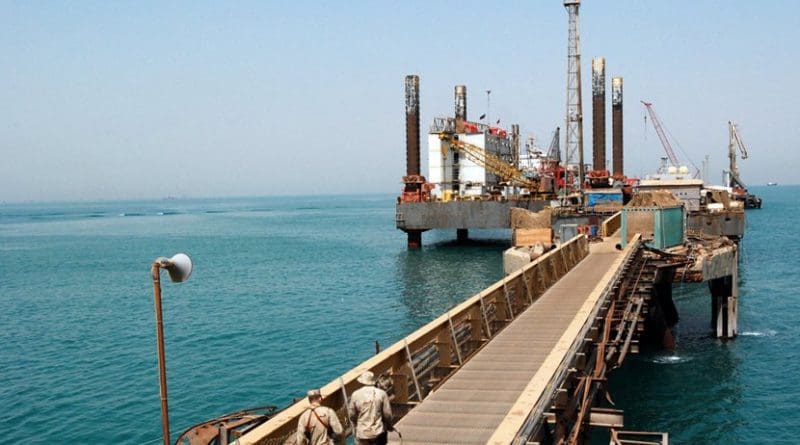Iraq’s Oil And Gas Sector: A Wise Action Is Required – Analysis
By Shahriar Sheikhlar*
Iraq is the third-largest oil producer in OPEC (Organization of the Petroleum Exporting Countries) after Saudi Arabia and Iran, also holds the World’s fifth-largest proved oil reserves in the world. Iraq’s oil production rate has been fluctuated frequently, mainly affected by the imposed wars against Iran (from 1980) and Kuwait in 1990-91 (named Persian Gulf War), Iraq war in 2003 and recently, war against ISIS (Islamic States in Iraq and Syria) since 2014.
According to the BP Statistical Review of World Energy (June 2017), Iraq held 153 billion barrels of proved crude oil reserves at the end of 2016, 9% of global reserves. Iraq’s oil production was doubled comparing to 2003 when it reached to 4,800,000 b/d in 2016 December, however some production issues beside stopping Kirkuk production after internal challenges reduced it to about 4,400,000 in 2017 December. The Kurdistan Regional Government (KRG)’s average share in Iraq’s total oil production was about 10% during second half of 2017 whereas the rest (90%) was produced in the fields overseen by Iraqi federal government.
While Iraq’s economy is strongly depended on oil export revenues (by more than 90%), about 20% of Iraqi’s oil production are used for supplying internal energy demands. In the absence of Nuclear or Renewable energy sources, more than 95% of Iraq’s primary energy sources are supplied from crude oil or it’s products; more expensive solution which deprive public treasury from their export revenues.
The county’s oil refining capacity, including Kurdistan region of Iraq (KRI), was more than 900,000 b/d in 2014 before ISIS attacked the Baiji; the biggest oil refinery in all the Iraq. Current refining capacity of Iraq is estimated to less than 700,000 b/d against demands which are above 1,000,000 b/d, the rest is supplied from Import. Also, the level of fuel oil produced in current refineries are Impressively high which could causes wasting crude oil in refining processes. Moreover, some power plants burn crude oil nearly 100,000 b/d or more while they could be fed by cheaper energy sources such as natural gas or oil products, couldn’t be achieved so far because of lack of refining technologies and gas processing capacities.
Iraq was the fourth-largest natural gas-flaring country in the world in 2014, it flared about 545 Bcf out of 771 Bcf natural gas production [1], the estimated value of of gas flared in Iraq is about $2.5 billion annually, huge economic losseswhichcould be sufficient for funding gas-based power generations.
Prior to 1990-91 Kuwait war, Iraq exported natural gas to Kuwait whereas the most of infrastructures and pipelines was damaged due to wars or inadequate maintenances. Meanwhile current Iraq’s gas production couldn’t back the plans for switching power generators’ feed to natural gas in short term. This could have postponed some some projects or supply some other projects from importing solutions.
As Iraq’s oil and gas sector has not been well-proportioned grown, achieving the ambitious targets of producing crude oil in the peak of world production rate will be risky wile infrastructures in upstream and midstream have not been expanded altogether. Further, undeveloped downstream sector raises government costs for processing and supplying the internal market.
Developing Iraq’s oil and gas sector requirers certain time, effective management, Comprehensive plans and significant investment to achieve:
Developing or re-developing oil fields to increase the production’s capacity
Installing gas processing plants to enhance gas production
Increasing recovery rates to boost the oil production by injecting water or associated natural gases to the current wells
Expanding pumping and storage infrastructures in the south of country to boost the export capacity
Renovation of northern oil pipeline to enable exporting through Turkey’s facilities
Reconstructing damaged refineries, especially the Baiji plant
Modernization of power stations to switch to natural gas and decrease their demand for oil and oil products
Indeed revising type of contracts with IOCs from TSC (Technical Service Contract) to PSA (Production-Sharing Agreement) could decrease initial investments for developing new fields or redeveloping current fields as well as installation of gas processing plants, however it’s a critical decision that doesn’t seem to be made soon.
Would Iraqi government attempt the goals by defineng the clear strategies and conducting fast improvements or stay in the same status to observe more fall in its oil production rate, as did in 2017? Next months will identify the future of this sector, at least for mid-term.
About the author:
*Shahriar Sheikhlar, Independent Energy Economy Analyst
Source:
This article was published by Modern Diplomacy
Notes:
[1] OPEC Annual Statistical Bulletin, 2015

